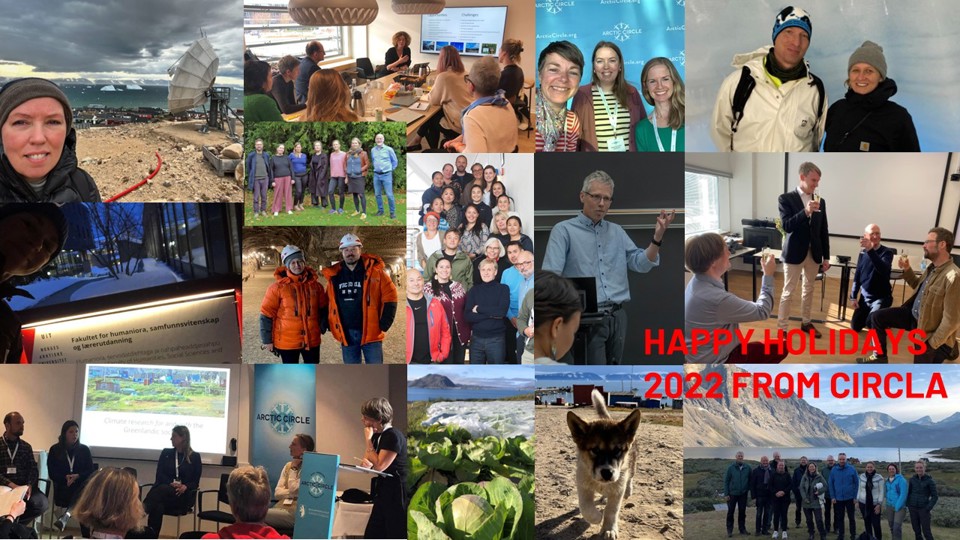From the Centre for Innovation and Research in Culture and Living in the Arctic, we extend warm greetings to research colleagues and partners in helping us make 2022 an exciting and productive year of research and collaboration. 2022 was a busy year for CIRCLA, and the lifting of covid-restrictions had us travelling to fieldwork, research stays and conferences across the circumpolar north, from Iceland to Alaska, Tromsø to Thule, Qaqortoq to Lapland.
Researchers on the move
Lill Rastad Bjørst has represented the Kingdom of Denmark together with Peter W.L. Linde in the third cohort of The Fulbright Arctic Initiative, which brings together a network of scholars, professionals, and applied researchers from the Arctic states. The aim is to address key research and policy questions related to creating a secure and sustainable Arctic. In May to August 2022, she was on an exchange visit to Dartmouth College (Dickey Center for International Understanding) with a visit to University of Alaska Fairbanks (Center for Arctic Policy Studies - CAPS). In Fairbanks she was invited by Troy Bouffard to see the Permafrost Tunnel (U.S. Army Engineer Research and Development Center (ERDC).
Mette Simonsen Abildgaard has been following Greenland’s developing tele-infrastructure and its impact on everyday life up close, with fieldwork in North Greenland, both in Qaanaaq and Thule Air base. The area is in Greenland’s satellite zone, but new possibilities in satellite technology offer promising opportunities for the region, and with them, hopefully more stable and affordable satellite connections.
Carina Ren spent the first semester of the year at Norway’s Arctic University/UiT enjoying time with Arctic tourism scholars. The stay also allowed for research visits at NORD University and University of Lapland and field trips related to several research projects on proximity tourism, sustainable Arctic cruise communities and tourism mobilities at the margins.
Highlights of the year
In Spring, we were also able to celebrate Patrik Stig Andersson as he successfully defended his compilation thesis, the result of a public sector industrial PhD project between the Geological Survey of Denmark and Greenland (GEUS) and Aalborg University. The thesis builds knowledge of how political framing in the Chinese state system plays out and how this framing along with other well-known factors affect the decisions of state and semi-state-owned enterprises to engage in projects outside China, especially in the Arctic. Congratulations, Patrik!
In October, Mette and Lill met with ex-CIRCLISTs Sophie Rud and Ulrik Pram Gad and new project participants from Greenland and Danish Institute for International Studies for a midway workshop in the "Imagine PoCo" project funded by a DFF Sapere Aude grant. Output from the project - particularly by CIRCLA researchers - are now available on the role of comparisons between Greenland and other places in relation to submarine tele cables, tourism and the green energy transition, as well on the overall theoretical approach of the project. Read more about the project and publications here: https://www.diis.dk/projekter/imagining-independence-greenlands-postcolonial-politics-of-comparison
CIRCLA’s visit to the Arctic Circle Assembly in Reykjavik offered opportunities to present the recent development on cruise tourism in Greenland, to participate in developing new ethical guidelines for Greenland but also taste extraordinary Arctic cuisine.
To end the year, Lill and Carina took part in the first in-person meeting with the FACE-IT project, a Horizon 2020 project on Arctic coastal ecosystem futures. As the project proceeds, Lill and Carina will be working to engage local stakeholders in adaptive and science-based co-management of fisheries and tourism.
Hope for peace in 2023
We said goodbye to covid lockdowns, travel restrictions and uncertainties only to see other crisis and uncertainties take over by the invasion of Ukraine in February. States and institutions across the globe have reacted with embargos and exclusions. Within academia Russia has become the target of condemnation and swift disassociation. This has left many academics to balance personal ties and grabble with the uncertainties linked to discontinuing projects with Russian association.
This was the case also in CIRCLA, where fieldwork, collaborations and ideas were abandoned as cooperation with Russian research institutions was suspended. This impacted ongoing projects such as the Sustainable Arctic Cruise Communities project and funding proposals in preparation.
From the view of Arctic research, this is a concern seeing Arctic research collaboration as a way towards peaceful co-existence. Being able for instance to monitor climate changes as well as documenting and thoroughly understanding the impacts of climate change on human, social and environmental conditions is of crucial importance.
Let’s hope that 2023 will see the resolution of the Ukraine invasion and a return to peaceful and much needed collaboration in the Arctic.
We entrust that the coming year will bring new projects and research partnerships. A first will be to develop a project on ‘the Arctic suburban dream’ as CIRCLA’s Robert Thomsen and Mette Abildgaard was awarded AAU bubble funding with Mette Mechlenborg from BUILD to chart how the modern Western dream of a suburban house with a garden unfolds in an Arctic context.
With this, we wish you a festive season. See you out there in 2023!
Warm regards,
CIRCLA and affiliates
